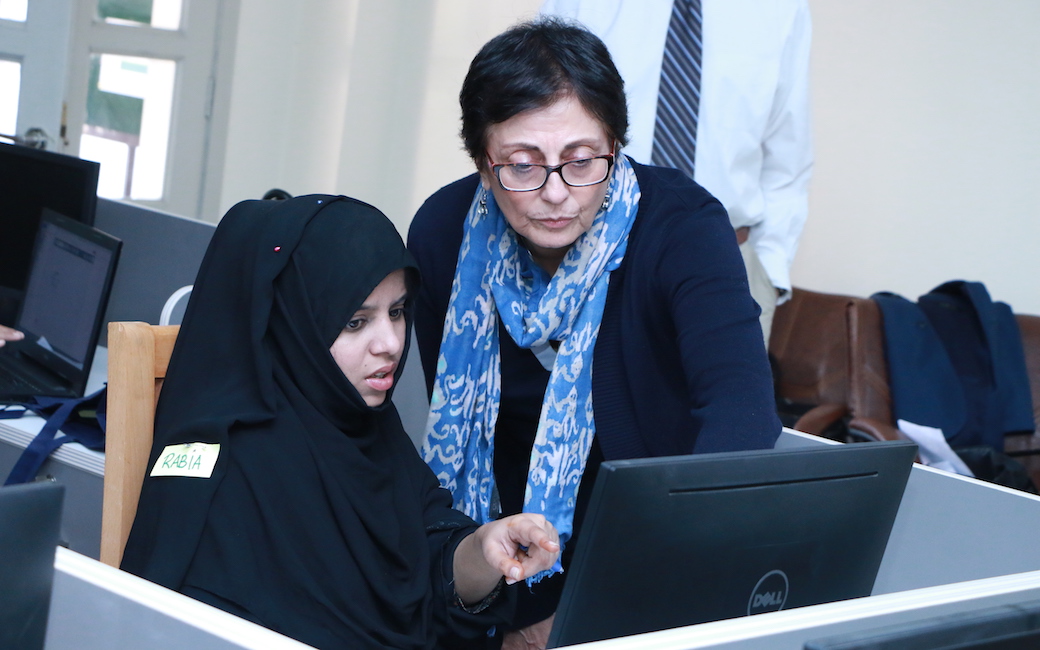
Professor goes to Pakistan; Trains middle schoolteachers in software
By Sophia Bates, Staff Writer
Photo Courtesy of Towson University
Towson Professor and Department Chair of Educational Technology and Literacy Mahnaz Moallem travelled to Pakistan in December to assist in running a software program training in partnership with the University of North Carolina Wilmington and the University of Education in Lahore.
The software, Squeak Etoys, is an open source program that utilizes problem-based learning and allows students to apply the concepts they are learning in the classroom to simulations that they develop.
“[Squeak Etoys] just comes up as a blank page but then a student can use it to try all different things to create models and simulations. They are learning the coding, but we are not teaching them the coding, they are really playing with it,” Moallem said. “But they have to apply their understanding of mathematics and sciences to develop the simulations.
Moallem’s trip to Pakistan this past Dec. focused on running a workshop at the University of Education, Lahore for teachers to learn the Squeak Etoys software, and help them develop ways to include it into their curriculum.
“The lecture-based approach doesn’t necessarily work [with the programs] environment,” Moallem said.
The workshops lesson focus was on water, water resources, water pollution and water management as these are all problems in Pakistan.
Moallem, who used to work with the University of North Carolina Wilmington, travelled with four colleagues from the university to run the workshop. According to Moallem, the trip was made possible by a grant from the Department of the State.
“Last spring this grant from the Department of the State came out and we thought that it was a good time for us to expand that beyond the U.S. and see how STEM teachers in other countries would receive it. So we applied for the grant and fortunately we were rewarded,” Moallem said.
The first day of the workshop had 36 teachers from the Lahore area, while the rest of the week involved teaching 16 different teachers that came from remote areas around Lahore. The University of Education handpicked two teachers from four boys schools and four girls schools to attend the workshop.
“The teachers that we targeted were from rural areas, from remote areas that they didn’t have a lot of the resources,” Moallem said. “Many of them travelled about 8 hours to Lahore because they were really in poverty, low-income areas.”
Moallem described the workshop as being as intense, with days starting as early as 8:30 a.m. and ending around 4 p.m.
“Some mornings we would focus on pedagogy and then our workshop was hands on so they would have to develop their curriculum and problem, and, in the afternoon, we would use SQUEAK. Some other days we would switch off, but it was pretty hands on throughout the day,” Moallem said.
Towson Dean of the College of Education Laurie Mullen said that the college has a history of collaboration, and that the grant project extends the colleges support to teachers in Lahore.
“The college is proud of the commitment to serve underserved schools with problem-based learning, computer modeling and STEM in support of water resource needs in the area,” Mullen said.
Now, the teachers are expected to use the Squeak Etoys software in their middle school classrooms. According to Moallem, they are still staying in touch and teaching the teachers through the use of the online educational platform, Edmodo.
“This semester we’re basically teaching them though Edmodo and also meeting online,” Moallem said. “Fortunately, they all have access to the internet so we’re trying to meet them on a regular basis through Zoom and Edmodo.”

